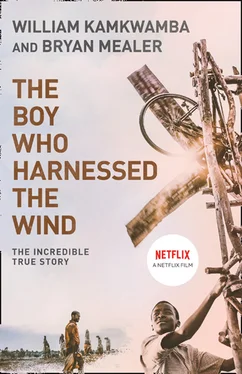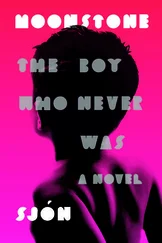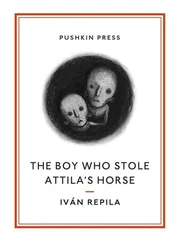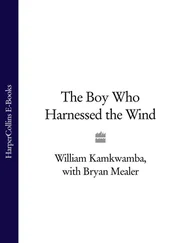1 ...6 7 8 10 11 12 ...15 In Dowa, there was a famous preacher named Reverend JJ Chikankheni, who happened to be one of my father’s most loyal customers. Reverend JJ led one of the biggest Presbyterian churches in Dowa, along with twenty-five smaller prayer houses across the district. He’d often stop by my father’s stall and buy a bag of rice and the two men would chat. One day, the reverend looked deep into my father’s eyes, as if scraping the bottom of his soul.
“Kamkwamba?” he said.
“Yes?”
“Do you know that God loves you, and that you disappoint Him every time you drink and fight and cause trouble?”
“Thanks, Reverend, but…”
“The good news is that even though you disappoint Him, He’s ready to receive you. He wants you to turn to Him.”
“Thanks, Reverend,” my father said, trying to be polite. “Whatever you say.”
A few nights later, my father was drinking as usual in the pub when a man walked up and knocked over his beer. The man was drunk and looking to fight the biggest guy in the room. Well, my father gave him what he wanted, and more. In a matter of seconds, the man lay on the floor with blood gushing from his ears. My father had to be pulled off the man, having nearly beaten him to death. The police soon arrived and arrested my father.
“You’ve really done it this time,” the officer told him.
The head prosecutor in Dowa was a church deacon named Mister Kabisa, who was also one of my father’s loyal customers. When Kabisa heard my father was in jail awaiting a trial, he paid a personal visit.
“Kamkwamba,” he said, “I’ve always advised you not to indulge in these unnecessary fights. Someday you’ll be killed or kill someone else, and look what happened here. You’re my friend, and I don’t want to lose you.
“You’re supposed to go to court today and stand trial,” Kabisa continued. “You’ll probably lose and be sent to jail, perhaps even Zaleka prison. You’ve heard about the conditions there. Chances are you won’t make it out alive.”
Mister Kabisa then leaned in close and looked into my father’s eyes the same way Reverend JJ had done, as if searching the dark corners of his heart.
“But I don’t want you to go to prison. There’s a better path for you. I’m willing to tear up these files and release you, but you have to promise me one thing.”
“Anything,” my father said.
“Turn your life over to God.”
Of course, my father happily agreed just to get out of jail. But what the man said stayed in his mind. All that evening and the following day, it never gave him peace.
The following night while asleep, my father was visited by a dream. All he saw was darkness, nothing but an endless expanse of black. He felt confused and scared. It was as if he’d gone blind and couldn’t shake himself awake. Then came a voice, piped in like a loudspeaker from heaven. It said: “These things will destroy you. Turn to me.”
When my father awoke in the morning, his entire body was trembling like a baby bird’s. The dream, plus all the advice and warnings of the past week, seemed too great a message to ignore. He woke up my mother, who lay sleeping beside him, and said, “My wife, today I’m turning to God. I’ve seen the signs, and now it’s time to change.”
That same morning, instead of going straight to work, my father stopped by the church to see Reverend JJ. The preacher was in his office.
“I’m here,” my father said. “I’m ready.”
My mother didn’t recognize this new man who began coming home each night after work, this man who suddenly had lots of money for food and medicine for his kids. She was so happy, but still couldn’t believe her good fortune. Each night for weeks, she’d still say, “Come here!” when he walked in the door, just to sniff his breath.
WHILE MY FATHER HAD been traveling, trading, and boozing, his older brother John had built up a booming business. Back in the late ’60s and early ’70s when President Banda was building all the big estates near Wimbe and Kasungu, there was lots of work for the local men. Building contracts were like gold, and Uncle John happened to know some of the managers who were hiring these subcontractors. Working as a kind of headhunter, John became the middleman, finding the right skilled, trustworthy crews to do the jobs. Because his judgment was always good, the estates paid him handsomly.
After several years of working for the estates, Uncle John saved enough money to start a farm imports business, buying and selling maize seed and fertilizer to the local farmers. He even had a small storefront in the trading center. This business became successful, and after a few years, he sold it and bought fifty-nine acres of land from Chief Wimbe, which he used to grow maize and burley tobacco—a kind of mild tobacco that’s cured in the open air under handmade shelters.
Since Uncle John had money for good fertilizer, the tobacco from his farm was top quality. His fields never had any weeds and the leaves were deep green while growing, drying like the color of milk chocolate with fine traces of red. His tobacco fetched a high price each year at the Auction Holdings Limited in Lilongwe, where the farmers sold their hundred-kilogram bales on the auction floor. One good bale of tobacco would pay for seventeen more bags of fertilizer, enabling his farm to stay strong, given the good weather.
In 1989, when I was one year old, Uncle John came to Dowa for a friend’s engagement party and stopped by for a visit. That night he and my father went for a walk.
“Why don’t you come back to the village and farm with me,” John said. “Things are going well.”
“I can see,” said my father. “But farming takes too long. I’ve gotten so used to the trading. How can I start something new?”
“It takes a long time, true. But if you invest that time and just a little money, the payoff is huge. Look what I’m making from tobacco. That kind of profit is impossible with trading. How much are you clearing each month with your rice and secondhand clothing? Five percent?”
“Four percent,” my father said. “Soon I won’t even be able to feed these kids. If I eat, my business suffers.”
“Well, come back home, young brother. There’s a big place waiting for you.”
My father then told John he’d stopped drinking and turned his life to God.
“Then, think of this as a chance to start over,” he said. “Consider this a sign.”
“Okay,” my father said. “You’ve convinced me.”
BY NOW WE HAD three kids (my sister Aisha had been born not long before) and my father saw this as an opportunity he couldn’t resist. A few weeks later, after selling his stall in the market, he strapped all our belongings—our clothes, pots, pans, and the family radio—to the top of a UTM (United Transport Malawi) bus. We traveled four hours north to the Wimbe trading center, where my relatives were waiting to greet us. They helped us move down the road to Masitala village and into a one-room house near Uncle John.
This is where my father became a farmer and my childhood began.
NOT LONG AFTER WE arrived, Uncle John acquired some additional land from Chief Wimbe, so he gave my father a one-acre plot about two kilometers from the house. There we could grow our own burley tobacco to sell, along with maize and other vegetables to eat. Maize is just another word for white corn, and by the end of this story, you won’t believe how much you know about corn.
When we first arrived, Uncle John was busy planting his tobacco, which was the first item that needed my father’s help. My father would wake up early before the first cock and go down to the grassy marshes in the valley, which we called dambo s. Because tobacco seeds require loads of water for them to break ground, many farmers plant nursery beds by the dambo s where they can easily water them daily. Each farmer has his own plot by the marsh—nothing official with papers or signatures, just a piece of ground you always know is yours. Not only is there water, but the soil in the dambo is deep black and full of nutrients that a little tobacco seedling requires to grow strong.
Читать дальше












